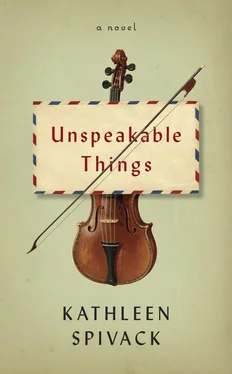Kathleen Spivack
Unspeakable Things
To music, which forgives everything.
In the drafty reading room of the New York Public Library, Herbert opened his latest letter from the little Rat, his old friend Anna Zygorzka. Her letters were slow to arrive, and each one bore the marks of a censor, who dutifully opened and read and then indicated the readership before sending it on to New York. Even David, who worked in the war office somewhat connected with censorship and foreign mail, could not predict the letters that arrived occasionally, tattered and humble, addressed in fine, studied handwriting. Herbert smoothed the paper, which crackled as he spread it out in front of him. He fixed his spectacles more firmly onto his nose and bent down happily. “J’arrive!”
Beside him on the bench, his grandchildren sat quietly. Philip studied his toes while he held a green balloon. And Maria, in her ruffled smocked dress and little sweater, bent over her English book as seriously as Herbert now bent over the handwriting of his letter. Maria’s lips did not even move as she read; she was concentrating. Although the first signs of spring were coming to New York, the interior of the library was cold and drafty. Herbert wrapped his coat more tightly around his shoulders, looking over to smile at the children. How good they were! So quiet and dear. He went back to the letter.
Herbert and Anna Zygorzka, second cousins, had been writing to each other for years. They corresponded in various languages, including Esperanto and French. Sometimes they alternated. Anna wrote to Herbert in German, and he answered in Russian. Then they corrected each other’s letters and started over again. And during that time, they also corresponded in chess.
Herbert smiled as he deciphered the numbers and letters. “Aha, now I have you!” Anna had written in large, distinctive handwriting. “Check to your queen!”
Herbert bent over the letter in delight. “We shall see,” he thought. “We shall see.” He looked more closely. Undoubtedly, he could find the loophole in this. Then he laughed. She had done it. He had taught her well. But this was not the end of this particular game. Herbert still had a few tricks up his sleeve. The Rat would regret challenging the old chess master. He smiled.
“Well, my dear friend,” he read in her large triumphant hand, “are you not proud of me? Guard your queen indeed, my old fox!”
Herbert imagined her nose twitching in triumph. That exquisite ugliness! Her dark, shiny eyes, peering at the chessboard — he had loved to watch her sniffing around the game. He imagined her little snort, a muted shriek of delight when she saw an opportunity for triumph. The Rat!
Underneath, Anna had written, in an equally exuberant scrawl, a few quick words. “The good news, my old dear friend, is that I am coming. I shall arrive soon. I cannot say more. Speak to David.” And then, as if to paraphrase her German, she wrote the same message hastily in French. “J’arrive!”
Herbert put the letter aside for a moment. As if disbelieving the message written, he bent to it again. “J’arrive!” How could that be?
Anna’s image rose in his mind. The seaside. Summer holidays with his parents. The arrival of his second cousins from Hungary. The other side of the family. The two mysterious girls, slightly younger, both, than he and his brother. Anna and her younger sister. The two girls. The two boys who awaited their arrival; a mystery unfolding.
What a disappointment it had been when he had first seen the Rat. She was small, unprepossessing, with a long nose. And could it be? Whiskers growing out of the mole next to her nose. Well, three long hairs, to be exact. A Rat with severe curvature of the spine, which caused her to move in a painful, crablike way, hunched over, peering upward over spectacles.
Anna and Herbert had looked at each other. Could this be the fabled cousin, so long awaited? Anna’s younger sister was normal in every way. Only, she was too young to do anything more than tag after the Rat and Herbert and his brother, whining to be included. So he was stuck, summer after summer, with the Rat for a companion. And a deformed Rat at that. A Rat who had to spend most of every day lying on a sofa, a Rat who could not stand straight when she walked, who moved slowly, painfully, with a little cane. A Rat with the most beautiful eyes, the most seraphic smile. A Rat with the face of an angel, made more beautiful by the imperfections that called attention to her beauty. This Rat had the power to enchant. She trembled inadvertently from time to time, as if this power were far too great for her little body to bear.
One day, the Rat dared to intrude upon Herbert’s silent avoidance of her. It was during one of her little slow-paced promenades. Herbert hated to watch her progress down along the sea; it was so slow and cramped. The Rat came right up to him, to the rock on which Herbert sat, thinking drearily of the meaninglessness of his life. He didn’t look at her directly, though he had covertly observed her approach.
Anna took a deep breath, gasping as she came to a halt beside him. “Why do you avoid me?” she asked without any preamble. “Is it the way I look?”
“No,” Herbert lied. He yawned.
“Come.” Anna held out her hand. “We can still be friends.” She touched his sleeve. A fine vibration was coming off Anna and it flowed from her hand through his body. Anna was shaking, her breath coming quickly in little gasps. She pressed her knees together and turned her head away.
Herbert took her arm and, still not looking at her, accompanied her back to the house. He was furious with himself.
“You know why they call me the Rat?” Anna said, still trembling, peering at him with deep, beautiful eyes. “Do I not resemble one?” Herbert tried to be polite. “It’s true, isn’t it?” persisted Anna. Herbert wanted to tear off her shawl, gaze at the nape of her neck, her twisted spine.
Anna shuffled beside him, bent over at a strange angle, leaning on Herbert. “You know,” she said forthrightly, “it’s lucky Papa has money. For I will probably never marry. And then,” she added sadly, “who would want to marry me?” Herbert felt her resignation. He said nothing, walking beside his cousin, a girl already burdened by rejection. Her little pawlike hands pressed his elbow. “It’s true.”
Herbert searched for something to comfort her. “But, Anna, you are intelligent, educated. Don’t give up hope. A young lady like yourself has a long life ahead.” He repeated platitudes.
“Do you really think so? Oh, Herbert!” Anna turned her face to his, looking upward. “Do you really think so? Do you think anyone will ever want to marry me?”
“Of course,” replied Herbert. “Plenty of gentlemen will want to.”
“Oh!” Anna’s lovely eyes misted over with joy, and her face crinkled into a smile.
Herbert was delighted with the effect his words had on her, although he noticed that she looked more like a rat than ever — a happy rat. Then inspiration hit him. “Anna, do you know how to play chess?” he asked.
She looked suddenly downcast again. “No, Cousin Herbert,” she said.
“Well then, I shall teach you,” said Herbert, feeling important. “We must not be idle just because it is summer.”
Soon Herbert found himself spending time with the Rat as she lay on her sofa. All summer Herbert and Anna played chess together, and the Rat was happy to follow his lead in other things as well. When Herbert read philosophy, the Rat read every book he recommended. She listened when he read aloud to her — poetry, drama — and Herbert was delighted to have an audience for his developing interests and adolescent self-importance. The Rat had a passionate intelligence and was not afraid to debate with him. A willing pupil, her pleasure in learning was intense. Herbert found he liked to spend time with her, liked to watch her long nose quiver at an idea, sniffing out the exact meaning of each phrase. Her little hands trembled with excitement; her whiskers vibrated with joy.
Читать дальше












